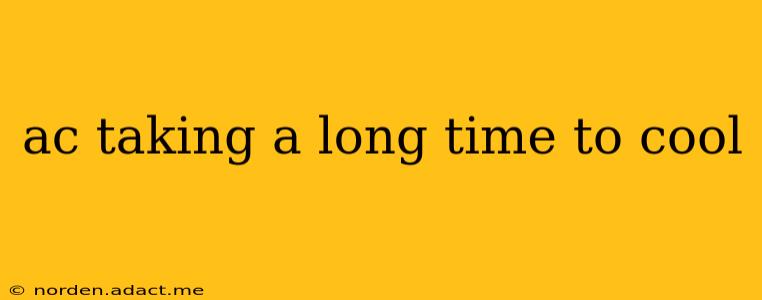Why is My AC Taking a Long Time to Cool? Troubleshooting Your Air Conditioner
Is your air conditioner struggling to cool your home, leaving you sweltering in the heat? A slow-cooling AC can be incredibly frustrating, but understanding the potential causes can help you troubleshoot the problem and get your home back to a comfortable temperature. This comprehensive guide explores common reasons why your AC takes a long time to cool and provides solutions to get it working efficiently again.
Is My AC Unit the Right Size for My Home?
This is a crucial starting point. An undersized AC unit will constantly run, struggling to meet the cooling demands of your home, leading to long cooling times and ultimately, higher energy bills. Conversely, an oversized unit will cool too quickly, leading to short cycles and potential humidity problems. Professional HVAC technicians can perform a load calculation to determine the appropriately sized unit for your specific space. Improper sizing is often the root cause of many cooling issues.
Are My Air Filters Clogged?
Dirty air filters restrict airflow, forcing your AC unit to work harder and longer to cool your home. This leads to reduced efficiency and extended cooling times. Check your air filters regularly (ideally monthly) and replace them as needed. A simple filter change can often dramatically improve your AC's performance. Consider using high-efficiency filters for optimal results.
Are My Vents Properly Adjusted?
Closed or obstructed vents restrict airflow, similar to clogged filters. Ensure all your vents are open and unobstructed. Proper airflow is crucial for even cooling throughout your home. Consider using vent covers to direct airflow if certain areas are consistently colder or warmer than others.
Is My Refrigerant Low?
Low refrigerant levels are a significant cause of inefficient cooling. Refrigerant is the substance that absorbs heat from your home and releases it outside. A refrigerant leak requires professional attention from an HVAC technician. They'll be able to identify the leak, repair it, and recharge your system with the correct amount of refrigerant. Never attempt to handle refrigerant yourself as it can be dangerous.
Is My Condenser Coil Dirty?
The condenser coil, located outside your home, releases heat absorbed from the inside. Dirt and debris can accumulate on the coils, restricting airflow and reducing efficiency. Regular cleaning (at least twice a year, ideally in spring and fall) is essential. You can often clean the coils yourself with a garden hose, but be cautious not to damage the fins. For a more thorough cleaning, consider professional assistance.
Is My AC Unit Old and Inefficient?
Older AC units may simply not be as efficient as newer models. They may have worn-out components that are reducing their performance. If your AC is more than 10-15 years old, it may be time to consider a replacement. New units are significantly more energy-efficient, potentially saving you money on your energy bills in the long run.
Is There a Problem with the Electrical Supply?
An inadequate power supply can prevent your AC unit from operating at its full capacity. Ensure your electrical supply meets the unit's requirements. If you notice unusual electrical issues, consult a qualified electrician.
Is My Thermostat Working Correctly?
A malfunctioning thermostat can lead to inaccurate temperature readings and incorrect cooling cycles. Try replacing the batteries first, then check its settings. If the issue persists, consider replacing the thermostat entirely.
By systematically checking these factors, you can often pinpoint the cause of your slow-cooling AC. However, if you're still experiencing problems, it's always best to contact a qualified HVAC technician for a professional diagnosis and repair. A properly maintained and appropriately sized AC unit will keep your home comfortable and energy-efficient for years to come.
